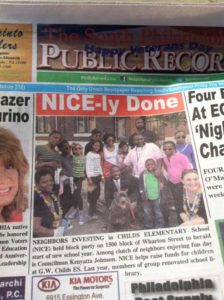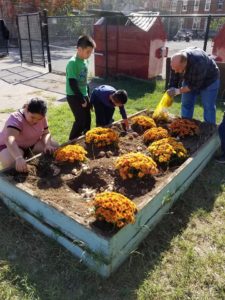On gentrification, education and teamwork: Neighbors Investing in Childs Elementary
 March 6, 2018
Category: Column, Featured, Long, Purpose
March 6, 2018
Category: Column, Featured, Long, Purpose
Cool Things Wit Cool People is a monthly column by Akeem Dixon focusing on community development. To ask a question, email coolthingswitcoolpeople@gmail.com, or reach out @akeemdixon.
This month’s Dear Akeem is the ultimate Parent Association meeting for birth, foster, god, grand and adoptive parents. Please grab some pizza, soda (tax included), pretzels or whatever your favorite community meeting snack food may be.
As neighborhoods are changing, so too are the students who attend local schools that have previously experienced closures, lack of resources and the sale of the physical buildings.
We’re talking gentrification — touchy subject, I know.
The same new faces you see in the brand-new homes, coffee shops and dog parks of certain neighborhoods have Mini-Mes who now are trickling into the local schools. New faces mean both new issues and old wounds being ripped open, but also new resources and access to networks.
Jennifer Devor, the president of Neighbors Investing in Childs Elementary (NICE) in Point Breeze, will explain how the volunteer organization has experienced success in connecting parents to resources and improving the school environment while encountering the challenges that arise when we tackle race, change, outdated policies and class.
Just like Wu Tang, we all love the kids.
###
Akeem Dixon: What is the origin of the organization? It seems to tackle education, organizing and policy.
Jennifer Devor: Neighbors Investing in Childs Elementary, also known as NICE, was founded in 2012 by neighbors looking to support their local public elementary school G. W. Childs.
What started as a relationship between NICE founder Megan Rosenbach and the then-art teacher, Ms. Pandolfi, turned into a variety of volunteer opportunities, and eventually a small group of committed neighbors without children of their own at the time, meeting regularly to support the school, it’s principal, teachers, staff and students. An organization with structure, fiscal sponsorship and a lot of talented individuals was formed.
AD: What are some of things your organization has accomplished or supports? Feel free to brag and cheer like a pre-K graduation.
JD: Some recent NICE initiatives include:
- Laying the groundwork for an extensive play space project (on the roof of the school!), and receiving $100,000 in funding from our Councilman Kenyatta Johnson to support it
- Securing an additional $115,000 for capital renovations and resorting the school’s historic auditorium where Martin Luther King, Jr. once delivered his now-famous “Blueprint” speech
- Worked with local business OCF Realty to install the school’s first teacher’s lounge complete with new refrigerator, couches and dining area
- Renovating the school library with new furniture, and adding special features like reading nooks and wall murals; NICE volunteers also have cataloged thousands of books to provide a comprehensive library collection
- Provide grant writing and assistance to bring new partnerships to the school
- Granted “microgrants” to teachers for classroom items like microscopes, headphones and other needs
- Provide teacher appreciation
- Hosts block parties, school supply drives and other neighborhood events to encourage community engagement
AD: Why should parents be excited to learn about this? How could these initiatives make their life as a parent easier?
JD: So, there are a few reason to be be excited: The fact of the matter is, Philly public schools still have a bad rap. Part of the work that NICE does is try to change the perception from negative to positive. In our school, we have great teachers, bright students and a lot of support from families and the neighborhood. We are not going into a school to “make it better,” but we are asking the school’s leadership, “What do you need our support in?” and then delivering on our commitments.
And, because groups like NICE have time and energy to be a “squeaky wheel,” we get the attention of different resources throughout the city — like arts programs, foundations, elected officials and other forms of community support. The parents, teachers and principal can focus on the kids and the school, and we can help with the “extras” — which in reality shouldn’t be extra, but given the state of the school district’s funding and internal resources, they are viewed as such. We also work with the school district, so that students, families and surrounding neighborhoods are aligned.
But really, everyone should be excited — even if you don’t have children or your kids are grown. When public schools thrive, the neighborhood thrives. From early childhood and beyond, every kid, teen and young adult in Philly deserves a good education.
AD: An engaged parent has a great kid. What steps should the parent take to become a part of your initiative or start one like it in their community? What skills need to be in the lunch box?
JD: I think there are a lot of different ways this question can be answered, and every family dynamic and home life is different, so I don’t think there is one magical thing that everyone needs to have. And honestly, engaging with a group like this might not even be the best use of a parent’s time, depending on those other factors.
But if there is time and energy to spare, working with either a “friends of” group like NICE or attending a School Advisory Council meeting (which every public school is required to have) is a great way to be informed and contribute whatever skills you may have, or want to develop. It can be something big like hosting a fundraiser or easy like bringing friends out to an event. Even just participating in a school supply drive or sharing a Facebook post can have impact. There is so much to be done, every little bit counts.
AD: What are some of the biggest challenges you’ve faced?
JD: I think both the perception and the reality of “friends of” groups can be a challenge. As much as groups like NICE need members, we need the right people who care about the community as a whole, and not just their kid, to engage. There have been several encounters over the years from white parents who have specifically expressed, “I want to get involved because I want more kids who look like mine to attend this school.” And my gut reaction is usually the same: “Whoa — hold up, what? …”
That is not what friends groups are about at all. It always goes back to the kids and families already attending the school. We often hear that our schools are “broke and need to be fixed,” but it is way more nuanced than that. Every school has a unique set of assets and challenges.
At their best, “friends groups” work with school leadership to identify which challenges the group can assist with and what additional funding and resources can benefit the school. But on the other hand, the reality is that a majority of the makeup of these groups are new, young and white Philadelphians.
It’s something that collectively the “friends of” groups are very aware of and are working on changing. We’re building coalitions with other groups that support local education, many for longer than NICE has, such as civic and registered community organizations, advocacy groups like Parent Power and Public Citizens for Children and Youth, business communities like the Indonesian American Council, and Home and School Associations and Schools Advisory Councils made up of current parents and teachers.
Another challenge is how to scale this work, so it’s not happening in just gentrifying neighborhoods and not just at the elementary school levels. There is so much opportunity, resources and best practices to be shared throughout the school district and into high schools, and so thinking about how that might occur is always on our minds.
AD: How have you been able to collaborate with your local school and the School District of Philadelphia, if at all?
JD: The entire nature of our organization is to collaborate with the school — so that’s a big yes. We see ourselves as the response team to supporting our school’s specific needs. And the same goes for the school district. We have a great relationship with different departments, like grants and strategic partnerships, because we know that it’s in everyone’s best interest to be transparent and collaborative.
And also, if you want to do ANY capital improvement projects at a school, which so many of them need, then you have to be on the same page as the district. Luckily, with everyone focused on the success and well-being of the students, it makes it easy and worthwhile.
AD: As communities change, so do the residents that use institutions like the schools. Let’s talk about your experience dealing with the effects of gentrification. How have you balanced the need to support our struggling schools, while dealing with race and trust issues?
Cheat code: If you have struggled with this, it’s OK. The whole world has as well, for forever! Plus, this is about the kids. Be honest, speak from the heart, and encourage a reader who wants to collaborate to reach out to you.
JD: I think this goes back to our core purpose; it’s got to be about every kid in your neighborhood in order to have a successful outcome. But trust and relationships don’t always come easy, and I think that is fair.
As white people living in a predominately African- and Asian-American community, with 10 different languages spoken at our school, our group needs to be aware of our privilege and be intentional with the way we connect with our neighbors. We must be active listeners and work to fully understand the social dynamics and political landscape that surrounds the schools.
Point Breeze, where we live and where NICE operates, is rapidly gentrifying. Our school makeup has been about 1 percent white for the past several years, and when my daughter starts kindergarten at Childs in September, her class alone might be anywhere from 5 to 10 percent white.
And we can’t just talk about race, but of course class also plays a big part in this, too. And we can definitely say that there are many studies about the importance and significance of racially and economically integrated schools, but that still doesn’t change the perception and realities of gentrification and the real life dynamics of the individuals involved.
But I do honestly believe that neighbors coming together over a common cause, one that is so important like education can be a catalyst for collaboration and collective change. And I can only speak from my own experience, but I see that happening with this work. There can be tension and hesitation, but more so I think there is embracing, understanding and mutual support.
###
In the immediate future, the goal is to give all children the opportunity to right many of the wrongs that WE are responsible for.
“Hi” typically opens lots of doors and is a great conversations starter, as do offering resources and expansive networks. Let’s start there — which means we have the makings for systematic changes as many of the hurdles that we continue to face and maneuver around are deep-rooted and taught throughout generations. Education and access is truly the great equalizer of many of our social evils.
So, here is a challenge. Say “hi” to a parent and join forces like the cast of “Black Panther,” and ask NICE how in the hell they achieved so much success and how they can help you replicate it at your child’s school.
Most important, keep in mind, we all love the kids!
Project
Cool Things Wit Cool PeopleTrending News











